Banaba
Other Names: Banaba Extract, Banabalean, Corosolic acid, Crape Myrtle, Crepe Myrtle, Extrait de Banaba, Lagerstroemia flos-reginae, Lagerstroemia speciosa, Munchausia speciosa, Myrte de Crêpe, Pride-of-India, Pyinma, Queen's Crape Myrtle.
Banaba is an herbal remedy extracted from the leaves of Lagerstroemia speciosa, a tree native to Southeast Asia. It is a flowering tree that is native to the Philippines and India, where it has been used for thousands of years as a treatment for digestive problems, kidney inflammation and diabetes. The Medical Health Guide reports that banaba can grow up to 30 feet high, producing pink and lavender flowers and leaves that are 3 inches wide by 7 inches in length. The banaba leaves are often used in herbal preparations, as they offer health benefits. Since banaba does not grow in most other parts of the world, it is taken as a dietary supplement.
See also : Pito-Pito Tea
Special Precautions of Banaba
Very little is known about the safety of using banaba in the long term. However, Never self-treat any medical conditions with banaba leaf, and get approval from your physician before adding it to your routine.
- Diabetes: there is some concern that banaba may reduce blood sugar levels. If you're considering the use of banaba, talk to your doctor before beginning treatment. Banaba can affect blood sugar control, so people with diabetes should monitor their blood glucose levels closely. If you have diabetes, it’s best to check with your healthcare provider before starting banaba.
- Low blood pressure. Banaba might lower blood pressure. In theory, taking banaba might make blood pressure become too low in people with low blood pressure.
- Surgery: Banaba might affect blood sugar levels and could make blood sugar control more difficult during and after surgery. Stop using banaba at least 2 weeks before a scheduled surgery.
- Medications for diabetes (Antidiabetes drugs) interacts with BANABA
The benefits of Banaba are
Long used in folk medicine, banaba is now available in supplement form. Proponents claim that banaba can promote weight loss and treat a wide range of health problems.Banaba contains corosolic acid, a substance shown to possess antioxidant, anti-inflammatory, antiviral, antifungal, and blood-sugar-lowering properties. Banaba also contains ellagitannins, a class of compounds that act as antioxidants.There is currently a lack of scientific evidence for the health effects of banaba. Some preliminary research indicates that banaba may offer certain health benefits, however, most of the available research is over ten years old. Here's a look at several key study findings:
- Banaba and Diabetes : Findings from laboratory studies and animal-based research suggest that banaba may help control diabetes. In a study published in Bioscience, Biotechnology, and Biochemistry in 1996, for instance, scientists demonstrated that treating diabetic mice with banaba extract helped protect against elevated blood sugar levels. In addition, banaba appeared to reduce total cholesterol levels.In 2003, the Journal of Ethnopharmacology published a study finding that type 2 diabetes patients treated with banaba extract for two weeks experienced a significant reduction in blood sugar levels. The number of study participants is unknown.
- Banaba and Weight Loss : Banaba may help fight obesity, according to a study published in the Journal of Nutritional Science and Vitaminology in 1999. In an experiment involving obese mice, researchers found that adding banaba to the animals' diets helped prevent weight gain. What's more, banaba-fed mice were less likely to experience buildup of triglycerides (a type of harmful blood fat).
- Cancer : The corosolic acid in banaba leaves also makes a contribution to cancer treatment. Researchers at Changhai Hospital in Shanghai, China tested corosolic acid against human cervical cancer cells. The results, published in the November 1, 2009 issue of "Cancer Letters," show that corosolic acid stimulates the release of cancer-cell-killing enzymes, resulting in cancer cell death. Not only has corosolic acid been shown effective against cervical cancer cells, but the DIO reports that leukemia, breast and liver cancer cells are also susceptible to its action.
- Metabolic Syndrome : Metabolic syndrome is explained by the American Heart Association as a group of conditions a person may have that increase susceptibility to heart disease and stroke. These conditions include high blood pressure, obesity, high cholesterol and triglycerides, and inflammation. Researchers at Mukogawa Women's University in Nishinomiya, Japan tested banaba leaf extract against several metabolic syndrome conditions. They found that by the end of 10 weeks of treatment, blood pressure had been lowered, fat metabolism had normalized and the body's inflammation levels had decreased, according to the published results in the November 25, 2006 issue of "Life Sciences."
